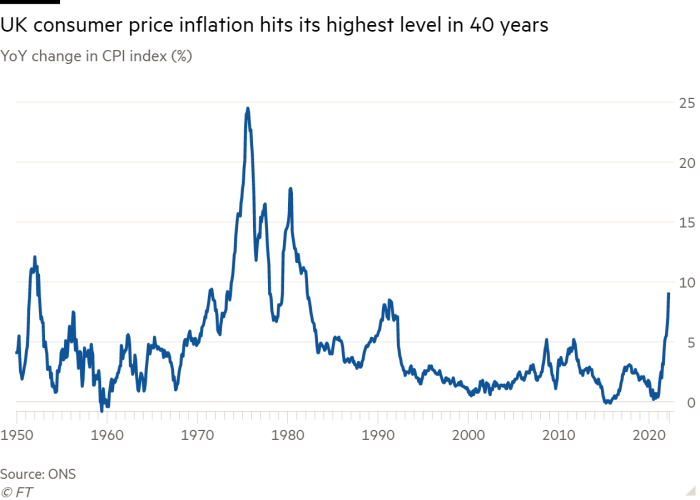UK inflation hit 9 per cent in April, its highest level in over 40 years, after soaring gas and electricity bills intensified the cost of living crisis facing households.
The rate of consumer price inflation was close to economists’ expectations and is almost double the rate the Bank of England expected only six months ago.
With economic activity slowing sharply during the first quarter of the year, the UK economy is suffering its worst bout of stagflation — weak growth alongside high inflation — since the second oil shock of the 1970s.
The sharp rise in the cost of living will add to pressure on chancellor Rishi Sunak to accelerate his promised measures to help poorer families and pensioners cope with prices rising much faster than their incomes.
In response to the figures, Sunak released a statement, blaming global shocks to energy prices. “We cannot protect people completely from these global challenges but are providing significant support where we can, and stand ready to take further action,” he said.
CPI inflation rose from 7 per cent in March to 9 per cent in April, putting it at the highest level among G7 countries and among the highest of any advanced economy in the world.

The Office for National Statistics said the 54 per cent increase in the energy price cap in April caused almost three-quarters of the increase in the inflation rate that month, but prices were also rising rapidly in almost all categories of expenditure and in goods leaving factories.
Grant Fitzner, the ONS chief economist, said the rise in raw materials was adding to pressure on manufacturers to pass on their higher costs. “This was driven by increases for food products, transport equipment and metals, machinery and equipment,” he said.
With inflation far in excess of the Bank of England’s 2 per cent target and the price of services also up 4.7 per cent on a year earlier, the widespread evidence that inflation is becoming more persistent is likely to add force to those wanting the central bank to raise interest rates further to cool the economy.
The Bank of England this week sought to deflect blame for the lack of control of inflation. Andrew Bailey, BoE governor, blamed global shocks for rising prices and said there was “not a lot we can do about it”.
Yael Selfin, chief UK economist at KPMG, said: “The [bank’s] Monetary Policy Committee will be keen to show they can keep inflation expectations anchored down the line. The key risk facing policymakers is if today’s high pace of inflation becomes embedded in pay negotiations, which will put additional pressure on prices to rise”.
Retail price inflation, using a discredited measure that still underpins the cost of index-linked government debt, rise to 11.1 per cent in April, also a 40-year high.
